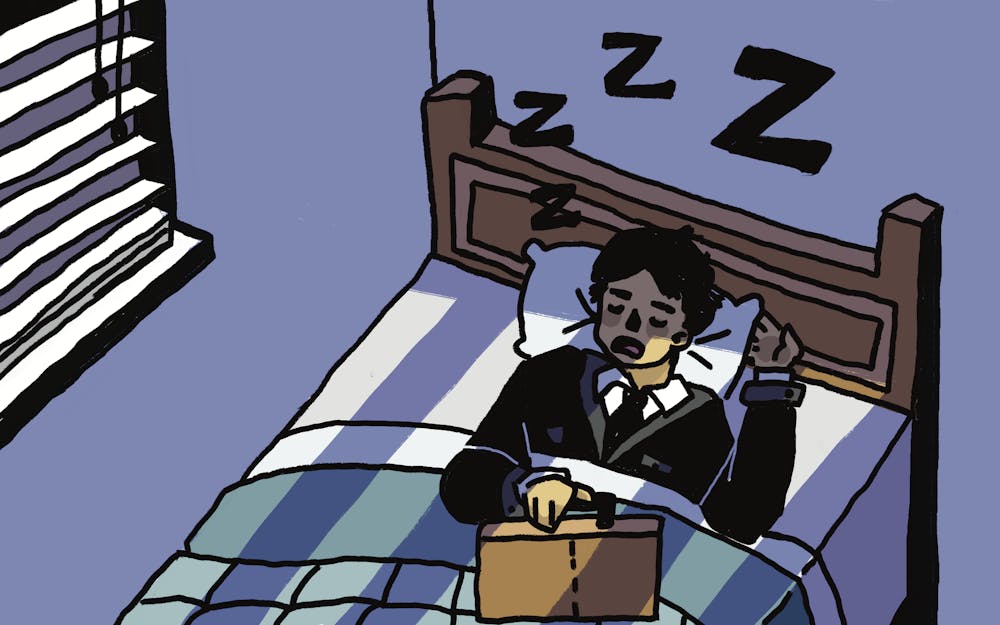On May 2, a 35-year-old investment banker Leo Lukenas III for Bank of America died possibly due to being overworked. Lukenas had told a recruiter he was working more than 100 hours every week and wanted to leave the company. There has been no official correlation between his cause of death, an acute coronary artery thrombus, a type of blood clot and his long, strenuous working hours, but you’re able to draw your own conclusions as blood clots have been proven to be a product of extended periods of anxiety. Nobody should be working that much; stress from working that many hours causes a plethora of health issues, and Lukenas’ death brings up concerns that have always been prevalent in the U.S. — are we being overworked?
On average, Americans work more than anyone in Europe; we clock in nearly 1,900 hours a year and work around 36 hours per week. We are also the most overworked developed nation in the world, according to the International Labour Organization. This is simply an average of almost all full-time American workers and does not take into consideration overtime workers, people with multiple jobs and extreme cases like the late investment banker.
So, since we’re working so much and it’s causing issues, why don’t we just stop working such long hours? The answer to this problem is not that simple. In America, the average full-time worker has little to no time for vacation and receives hardly any paid time off, as per the Fair Labor Standards Act. Paid vacation time off is not mandatory in the U.S.
Something you may have experienced as well is the guilt of calling in to work or taking a vacation. This is because of the work-life culture balance in the U.S. We are expected to work and grind our way to the top; taking breaks, after all, only prevents us from reaching those top-tier promotions and job opportunities. On the contrary, in the EU, full-time workers get much more PTO than Americans. It’s a reversal of the situation here. For European workers it would be unusual if they tried to work overtime and concede their vacation time, similar to how Americans may feel awkward trying to get more time off.
It’s a rough paradox. We’re expected to work grueling hours in exchange for a good job, however we exchange a lot more than a long work week. Working more makes us sacrifice our good routines, like exercise and proper nutrition. However, it also induces chronic stress, which can lead to habits like smoking and drinking. And it’s also quite literally killing us — people who work more than 54 hours a week are at major risk of dying from overwork, the deadliest occupational disease.
Not only are we working more hours than we should be, but we’re also getting underpaid. Since the 1970s, average hours worked have increased while average pay has decreased when adjusted for inflation. This means that Americans are working more, earning less and dying from excessive hours worked. This is not a healthy lifestyle, and it needs to change for the health and wellbeing of full-time workers around the country. I think by decreasing hours worked and maintaining a better work-life balance, other issues will begin to improve, such as the amount of smokers or people with severe levels of stress.
To work toward this goal, we should institute a 32-hour workweek. There’s much controversy with this proposal, but by decreasing the number of hours worked in a week, lowering the overtime pay threshold to 32 hours and increasing the amount of productivity in the workplace, we can effectively change the way people balance their work-life balance and increase happiness across the nation.
If we don’t do something now, what will happen 20 years from now? How much more will we be working then, and how much less will we be getting compensated? How many more work-related disorders and cases of chronic stress must there be before the system changes and the prerequisites for promotion won’t cost your sanity and health? America has a problem, and it’s going to take some work to solve it.
Vincent Winkler (he/him) is a freshman studying sociology.






